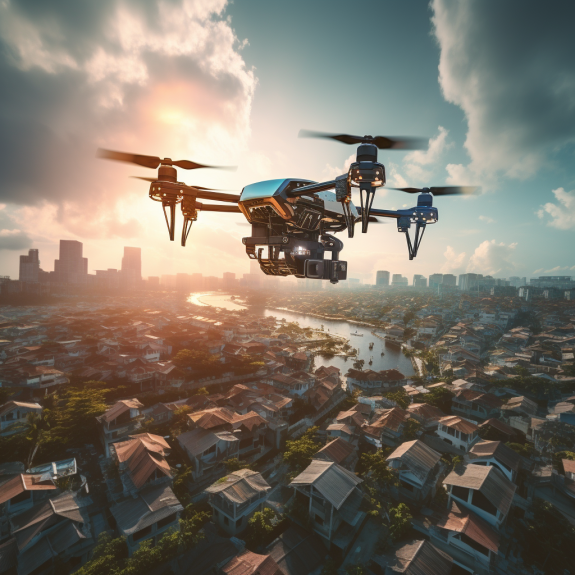
The Future of Biomedical Transport: Drones at the Service of Health
Testing drones for aerial transport of biomedical material: Living Lab at San Raffaele Hospital
Innovation in healthcare is taking giant steps forward thanks to the collaboration between the San Raffaele Hospital and EuroUSC Italy in the context of the H2020 European project Flying Forward 2020. This ambitious project aims to expand the boundaries of the application of Urban Air Mobility (UAM) and is revolutionising the way biomedical material is transported and managed through the use of drones.
The H2020 Flying Forward 2020 project was developed by the Centre for Advanced Technologies for Health and Well-being at San Raffaele Hospital, in collaboration with 10 other European partners. Its main aim is to develop innovative services for the safe and reliable transport of biomedical materials using drones. According to engineer Alberto Sanna, director of the Centre for Advanced Technologies for Health and Well-being at San Raffaele Hospital, drones are an integral part of a vast digital ecosystem that is transforming urban mobility into a new cutting-edge era.
San Raffaele Hospital coordinates Living Labs in five different European cities: Milan, Eindhoven, Zaragoza, Tartu and Oulu. Each Living Lab faces unique challenges, which may be infrastructural, regulatory or logistical. However, they all share the common goal of demonstrating how new urban aerial technologies can improve the lives of citizens and the efficiency of organisations.
So far, the project has led to the creation of a physical and digital infrastructure needed to develop urban air mobility in a safe, efficient and sustainable manner. This involves the implementation of innovative solutions for the use of drones in cities. Furthermore, the project is consolidating valuable experience and knowledge for the future implementation of aerial transport services for biomedical material.
One of the most significant moments was when the San Raffaele Hospital started the first practical demonstrations. The first demonstration involved the use of drones to transport drugs and biological samples within the hospital. The drone picked up the required drug from the hospital pharmacy and delivered it to another area of the hospital, demonstrating the potential of this system to connect clinics, pharmacies and laboratories in a flexible and efficient way.
The second demonstration focused on security within the San Raffaele Hospital, presenting a solution that could also be applied in other contexts. Security personnel can send a drone to a specific area of the hospital for real-time reconnaissance of dangerous situations, thus helping to better manage emergencies.
A crucial part of this project was the collaboration with EuroUSC Italy, which provided advice on regulations and safety related to the use of drones. EuroUSC Italy played a key role in identifying the European regulations, directives and safety standards needed to conduct compliant flight operations.
The project also involved the integration of several U-space services and BVLOS (Beyond Visual Line Of Sight) flights, which require specific operational authorisations. In addition, the project involved the operator ABzero, an Italian start-up and spin-off of the Scuola Superiore Sant’Anna in Pisa, which developed its certified container with artificial intelligence called Smart Capsule, which increases the autonomy of drones in performing logistics and monitoring services.
In summary, the H2020 Flying Forward 2020 project is redefining the future of air transport of biomedical material through the innovative use of drones. San Raffaele Hospital and its partners are demonstrating how this technology can improve people’s lives and safety in cities. Also crucial is the importance of evolving regulations to ensure the success of such cutting-edge initiatives.


